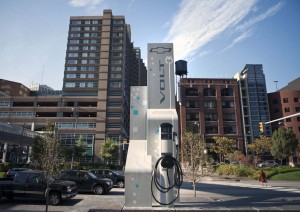American motorists: (will buy electric vehicles)…(won’t buy electric vehicles)…(don’t even know what electric vehicles are).
If that lead seems confusing, don’t worry, a spate of new surveys suggests you’re not alone.
Earlier this week, the well-respected J.D. Power and Associates predicted battery-based vehicles will be largely ignored for at least the next decade, accounting for no more than 7% of the global market by 2020. But now, a new report from the equally well-regarded Consumer Reports says that 39% of American motorists will consider a hybrid, plug-in or battery-electric vehicle the next time they go shopping.
Among the CR survey’s other findings:
- 63% of the respondents said they travel less than 40 miles a day, which would make them candidates for both battery cars and plug-ins, like the Nissan Leaf or Chevrolet Volt, respectively;
- 51% said being green is an increasingly important factor in their car buying decisions;
- Even so, quality, price and value are more important factors, being environmentally-friendly ranked only 11th of 12 factors on the CR survey;
- Among the 39% who are considering some form of battery power, 60% are leaning in favor of a conventional hybrid, while the rest are looking at some more advanced technology.
Interviewed early this week, David Champion, Consumer Reports’ director of automotive testing, acknowledged that there’s a distinct difference motorists’ actual and perceived needs.
“I think people would be surprised just how much they’d be able to do on battery power,” he said, while conceding that even though a Leaf or a Volt could meet the needs of the vast majority of Americans, there’s still plenty of concerns about the disadvantages of battery power, such as higher costs and limited range.
For the auto industry, it will be a challenge to win buyers over, Champion added, suggesting “It’s a numbers game for the consumer,” and one that will generally not favor electric propulsion over conventional gasoline power, despite significantly lower per-mile energy costs.
That may explain the discrepancy between the two studies. While CR’s data reveals what motorists might like to purchase, Power focuses on what consumers likely will put their money down on. And that’s a lot smaller number.
Incidentally, another bit of research, this by the consulting firm PRTM, is more bullish than Power when it comes to actually getting motorists to buy into electric propulsion.
“PRTM believes that it’s not a matter of if—but how fast and to what extent—different electrified vehicles will be adopted as we approach an electrification tipping point,” says analyst Oliver Hazimeh. “PRTM estimates that there are different degrees of electrification with different penetration rates, i.e. by 2020 PRTM estimates that EVs will have a 4-5% adoption rate; plug in hybrid electric vehicles will be at 5-6%; and hybrid electric vehicles will reach 20%.”

